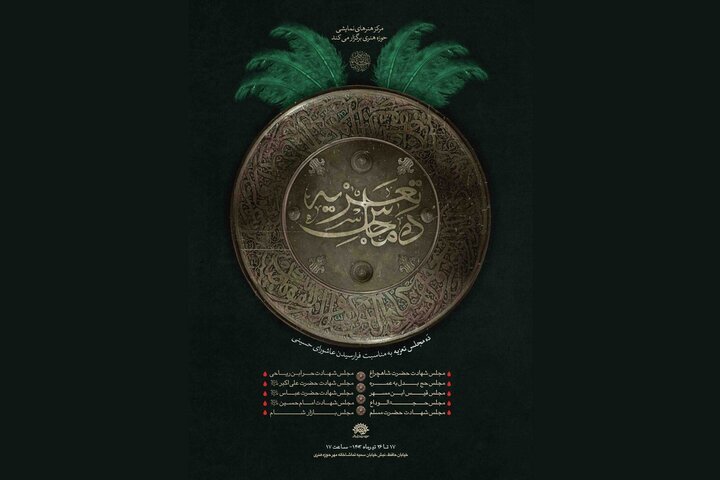Tazieh performances to go on stage at Tehran’s Art Bureau

TEHRAN- Iran's Art Bureau of the Islamic Ideology Dissemination Organization in Tehran is playing host to performances of tazieh, Iranian passion play, during the first ten days of the lunar month of Muharram.
During the Muharram rituals, millions of Muslims commemorate the martyrdom anniversary of Imam Hussein (AS), the grandson of Prophet Muhammad (S).
Directed by Aboulfazl Mirza-Ahmadi, the group begin their performances every night at 5 p.m. for ten nights.
The group is scheduled to perform “Shah Cheragh (AS) Tazieh”, “Hazrat Muslim (AS) Tazieh”, and “Hurr ibn Riahi Tazieh” among others.
“Shah Cheragh (AS) Tazieh” is about the martyrdom of Hazrat Ahmad ibn Musa (AS) who, along with his brothers, including Seyyed Alaeddin Hossein (AS), embarks on a journey to visit their brother, Imam Reza (AS), in the Khorasan region.
However, Fars ruler Qotlogh Khan is assigned by Abbasid caliph Mamun the task of stopping them. They all are killed in an intense battle with the ruler’s men.
“Hazrat Muslim (AS) Tazieh” portrays the journey of Muslim ibn Aqil al-Hashimi (AS), the messenger of Imam Hussein (AS), to Kufa a few days before the Ashura uprising that led to the martyrdom of the Imam and his companions in 680.
“Hurr ibn Riahi Tazieh” is about Hurr ibn Riahi, one of Yazid’s commanders, who joined the troops of Imam Hussein (AS) on the eve of Ashura.
“Ali al-Akbar (AS) Tazieh” and “Abbas ibn Ali (AS) Tazieh” are also among the highlights of the performances.
“Ali al-Akbar (AS) Tazieh” tells the story of Ali al-Akbar, the son of Imam Hussein (AS), who displayed unwavering bravery and selflessness during the Battle of Karbala, ultimately giving his life while fighting alongside his family against the forces of Yazid's army.
“Abbas ibn Ali (AS) Tazieh” is about Abbas (AS), the brother of Imam Hussein (AS), who was a key figure in the Battle of Ashura, serving as commander and standard-bearer of Imam Hussein (AS)'s caravan. He was renowned for his virtues, including dignity, bravery, generosity, and obedience to the infallible Imam.
In Karbala, he played a crucial role as water-supplier for his brother's army, earning him the nickname Saqqa (the water-supplier). Despite facing challenges, he successfully brought water for the family and companions of Imam Hussein (AS)on multiple occasions. On the Day of Ashura, he attempted to fetch water from the Euphrates once more, but was martyred after being shot in the leather pouch and having his hands cut off by Yazid's army.
The Iranian passion play tazieh was registered on the UNESCO List of the Intangible Cultural Heritage of Humanity in November 2010.
Tazieh represents religious events, historical and mythical stories and folk tales. Each performance has the four components of poetry, music, song and motion.
However, stories about the uprising of Imam Hussein (AS) and his companions against the oppressive Umayyad dynasty in 680 CE are more highly regarded by tazieh troupes and audiences.
Performers are always male, and female roles are played by men, most of whom are amateurs who gain their living through other means but perform for spiritual rewards.
It is a kind of drama that depicts the event of Ashura and is performed in Mahur, Chargah, and Shur Baghdad radifs of Iranian music.
It is based on the Ashura culture and the brave war and martyrdom of Imam Hussein (AS). It is a religious play dated back to 9th-century dynamites and Buyids. However, Tazieh performance began during the Safavid era (1501-1736) and flourished during the Qajar era.
SAB/
